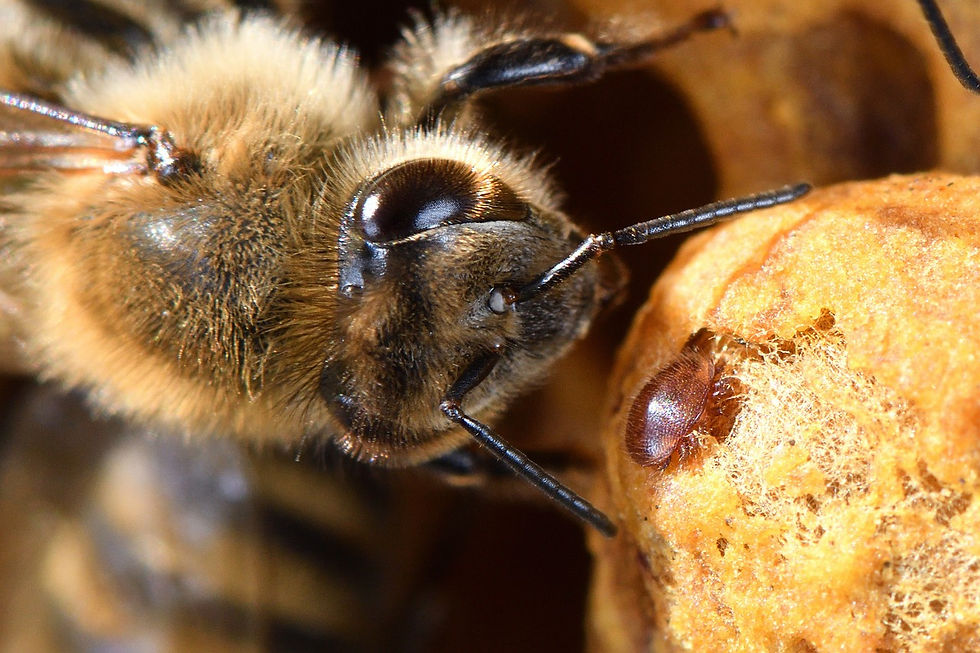BICWA's Commitment to Protect Western Australia's Beekeeping Industry from Varroa
- bicwaorg
- Sep 21, 2023
- 3 min read
Updated: Sep 22, 2023
DATE: 21 September 2023
The New South Wales transition to Varroa management may cast a shadow of concern, but rest assured, BICWA is committed to making every effort to lead a joint effort with the latest technologies, to protect the pleasure of beekeeping here in WA.
The Varroa management decision was made at the national level, at the Australian Honey Bee Industry Council (AHBIC), with the majority vote supporting the transition into management.
Whilst BICWA was not a supporter, Chair Brendon Fewster stated, “We stand in solidarity with our fellow beekeepers in the East, who have endured significant hardships, both professionally and personally.”

BICWA is now focused on preparing for a future with Varroa in Australia whilst keeping WA safe.
Brendon Fewster says, “As this is such a difficult pest to detect, we believe multiple strategies are needed to look after the WA beekeeping community.”
This is an outline of the action plan developing:
Pause the importation of honey bee products.
In a letter to the Minister of Agriculture, BICWA requested an immediate halt to all honey bee product imports into WA. This will give needed time to reinforce current preparations. Honey bee products can attract feral colonies and harbour viruses. At present, the mite-carrying capacity and virus spread is unclear.
BeeSentry surveillance
BICWA has contributed to the development of a Smart Camera System positioned on an attractant feeding station to identify bee species and if they are carrying Varroa. This approach negates the need for hive management, identifies exotic as well as honey bees, and includes the attraction of feral bees.
Environmental-DNA surveillance
Detection of Varroa, through the screening of the freshwater honey bees used to survive for eDNA is an additional layer of detection. eDNA Frontiers (Curtin University), has developed an eDNA tool in collaboration with the University of Canberra to make it available for use in WA.
Mandatory hive location and tracking system
Beekeepers have a legal obligation to keep records of their beekeeping activities, including hive tracking. A prompt history of hive movement is crucial in a Biosecurity response to minimise the impact on hives caught in the alert. By developing an app for this hive tracking with direct sharing with Biosecurity, immediate and successful containment is possible. DPIRD is currently reviewing an app for implementation.
Compliance officers
A key learning from the NSW experience was that not all beekeepers are compliant with regulations. A recent survey here in WA showed we were not any better, and our beekeeping community is exposed to unnecessary risk. Two compliance officers have been requested.
Emergency response plan and funding for an incursion in WA
BICWA is participating in the development of a WA emergency response plan and discussing the funding required to implement this plan. Prior to a Varroa detection, everyone needs to understand what the agreed expectations are for the beekeeping community, dependent businesses, and pollination-dependent agriculture. This requires collaboration and communication with multiple stakeholders and an agreed plan developed.
Beekeeping with Varroa
If Varroa becomes endemic in WA, collectively, WA beekeepers need to decide their path. Many questions need to be addressed, and whilst this may never be realised, the earlier these conversations are initiated, the easier for a future transition.
Package bee and queen export program to support the eastern states
By keeping free of Varroa, WA can offer package bees, nucs, or queens to East Coast beekeepers to help them recover their lost colonies. This is especially important for pollination-dependent agriculture in the East. WA already supports Canadian beekeeping and agriculture by providing packaged bees.
Key messages
BICWA's commitment to preserving Western Australia's beekeeping industry and protecting our unique environment remains steadfast.
BICWA is determined to employ every resource at our disposal to keep WA varroa-free and maintain the integrity of our local beekeeping community.
Brendon Fewster urges, “We call upon everyone to remain committed, vigilant, and supportive in safeguarding our invaluable industry! “
Individual beekeeper actions:
These actions build awareness, keep you updated, and strengthen our resilience. Your commitment matters.
Register your Hive Brand: https://www.agric.wa.gov.au/plant-biosecurity/becoming-beekeeper-western-australia
Pay the APC Fee for Service: https://apcwa.org.au/producers-committees/beekeepers#:~:text=The%20charges%20are%3A,in%20production%20%3D%20%40%20%241.00%20per%20hive
Join BICWA Membership: https://www.bicwa.com.au/membership
Attend Training:
Online: Plant Health Australia, Biosecurity Online Training (BOLT) https://www.planthealthaustralia.com.au/resources/training/biosecurity-online-training/
In Person: WA Apiarists’ Society: https://waas.org.au/training
If there was ever a time to support your peak industry body in WA, that time is now!
For more information or media enquiries, please contact:
BICWA email: info@bicwa.com.au
BICWA Chair, Brendon Fewster, 0417 920 003




Comments